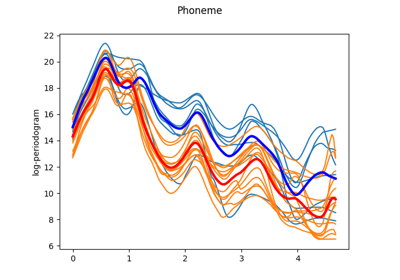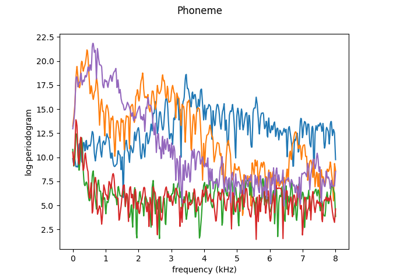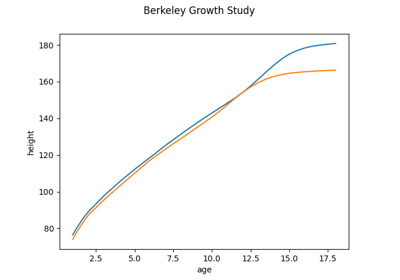KernelSmoother#
- class skfda.preprocessing.smoothing.KernelSmoother(kernel_estimator=None, *, weights=None, output_points=None, metric=LpDistance(p=2, vector_norm=None))[source]#
Kernel smoothing method.
This module allows to perform functional data smoothing.
Let \(t = (t_1, t_2, ..., t_n)\) be the points of discretisation and \(X\) the vector of observations at that points. Then, the smoothed values, \(\hat{X}\), at the points \(t' = (t_1', t_2', ..., t_m')\) are obtained as
\[\hat{X} = \hat{H} X\]where \(\hat{H}\) is a matrix described in
HatMatrix.Examples
>>> from skfda import FDataGrid >>> from skfda.misc.hat_matrix import NadarayaWatsonHatMatrix >>> fd = FDataGrid( ... grid_points=[1, 2, 4, 5, 7], ... data_matrix=[[1, 2, 3, 4, 5]], ... ) >>> kernel_estimator = NadarayaWatsonHatMatrix(bandwidth=3.5) >>> smoother = KernelSmoother(kernel_estimator=kernel_estimator) >>> fd_smoothed = smoother.fit_transform(fd) >>> fd_smoothed.data_matrix.round(2) array([[[ 2.42], [ 2.61], [ 3.03], [ 3.24], [ 3.65]]]) >>> smoother.hat_matrix().round(3) array([[ 0.294, 0.282, 0.204, 0.153, 0.068], [ 0.249, 0.259, 0.22 , 0.179, 0.093], [ 0.165, 0.202, 0.238, 0.229, 0.165], [ 0.129, 0.172, 0.239, 0.249, 0.211], [ 0.073, 0.115, 0.221, 0.271, 0.319]]) >>> kernel_estimator = NadarayaWatsonHatMatrix(bandwidth=2) >>> smoother = KernelSmoother(kernel_estimator=kernel_estimator) >>> fd_smoothed = smoother.fit_transform(fd) >>> fd_smoothed.data_matrix.round(2) array([[[ 1.84], [ 2.18], [ 3.09], [ 3.55], [ 4.28]]]) >>> smoother.hat_matrix().round(3) array([[ 0.425, 0.375, 0.138, 0.058, 0.005], [ 0.309, 0.35 , 0.212, 0.114, 0.015], [ 0.103, 0.193, 0.319, 0.281, 0.103], [ 0.046, 0.11 , 0.299, 0.339, 0.206], [ 0.006, 0.022, 0.163, 0.305, 0.503]])
The output points can be changed:
>>> kernel_estimator = NadarayaWatsonHatMatrix(bandwidth=2) >>> smoother = KernelSmoother( ... kernel_estimator=kernel_estimator, ... output_points=[1, 2, 3, 4, 5, 6, 7], ... ) >>> fd_smoothed = smoother.fit_transform(fd) >>> fd_smoothed.data_matrix.round(2) array([[[ 1.84], [ 2.18], [ 2.61], [ 3.09], [ 3.55], [ 3.95], [ 4.28]]]) >>> smoother.hat_matrix().round(3) array([[ 0.425, 0.375, 0.138, 0.058, 0.005], [ 0.309, 0.35 , 0.212, 0.114, 0.015], [ 0.195, 0.283, 0.283, 0.195, 0.043], [ 0.103, 0.193, 0.319, 0.281, 0.103], [ 0.046, 0.11 , 0.299, 0.339, 0.206], [ 0.017, 0.053, 0.238, 0.346, 0.346], [ 0.006, 0.022, 0.163, 0.305, 0.503]])
- Parameters:
kernel_estimator (HatMatrix | None) – Method used to calculate the hat matrix (default =
NadarayaWatsonHatMatrix)weights (ndarray[Any, dtype[float64]] | None) – weight coefficients for each point.
output_points (_SupportsArray[dtype[Any]] | _NestedSequence[_SupportsArray[dtype[Any]]] | bool | int | float | complex | str | bytes | _NestedSequence[bool | int | float | complex | str | bytes] | Sequence[_SupportsArray[dtype[Any]] | _NestedSequence[_SupportsArray[dtype[Any]]] | bool | int | float | complex | str | bytes | _NestedSequence[bool | int | float | complex | str | bytes]] | None) – The output points. If omitted, the input points are used.
So far only non parametric methods are implemented because we are only relying on a discrete representation of functional data.
Methods
fit(X[, y])Compute the hat matrix for the desired output points.
fit_transform(X[, y])Fit to data, then transform it.
Get metadata routing of this object.
get_params([deep])Get parameters for this estimator.
hat_matrix([input_points, output_points])score(X, y)Return the generalized cross validation (GCV) score.
set_output(*[, transform])Set output container.
set_params(**params)Set the parameters of this estimator.
transform(X[, y])Multiply the hat matrix with the function values to smooth them.
- fit_transform(X, y=None, **fit_params)[source]#
Fit to data, then transform it.
Fits transformer to X and y with optional parameters fit_params and returns a transformed version of X.
- Parameters:
X (array-like of shape (n_samples, n_features)) – Input samples.
y (array-like of shape (n_samples,) or (n_samples, n_outputs), default=None) – Target values (None for unsupervised transformations).
**fit_params (dict) – Additional fit parameters.
- Returns:
X_new – Transformed array.
- Return type:
ndarray array of shape (n_samples, n_features_new)
- get_metadata_routing()#
Get metadata routing of this object.
Please check User Guide on how the routing mechanism works.
- Returns:
routing – A
MetadataRequestencapsulating routing information.- Return type:
MetadataRequest
- get_params(deep=True)#
Get parameters for this estimator.
- set_output(*, transform=None)#
Set output container.
See Introducing the set_output API for an example on how to use the API.
- Parameters:
transform ({"default", "pandas"}, default=None) –
Configure output of transform and fit_transform.
”default”: Default output format of a transformer
”pandas”: DataFrame output
”polars”: Polars output
None: Transform configuration is unchanged
New in version 1.4: “polars” option was added.
- Returns:
self – Estimator instance.
- Return type:
estimator instance
- set_params(**params)#
Set the parameters of this estimator.
The method works on simple estimators as well as on nested objects (such as
Pipeline). The latter have parameters of the form<component>__<parameter>so that it’s possible to update each component of a nested object.- Parameters:
**params (dict) – Estimator parameters.
- Returns:
self – Estimator instance.
- Return type:
estimator instance
Examples using skfda.preprocessing.smoothing.KernelSmoother#

Voice signals: smoothing, registration, and classification


